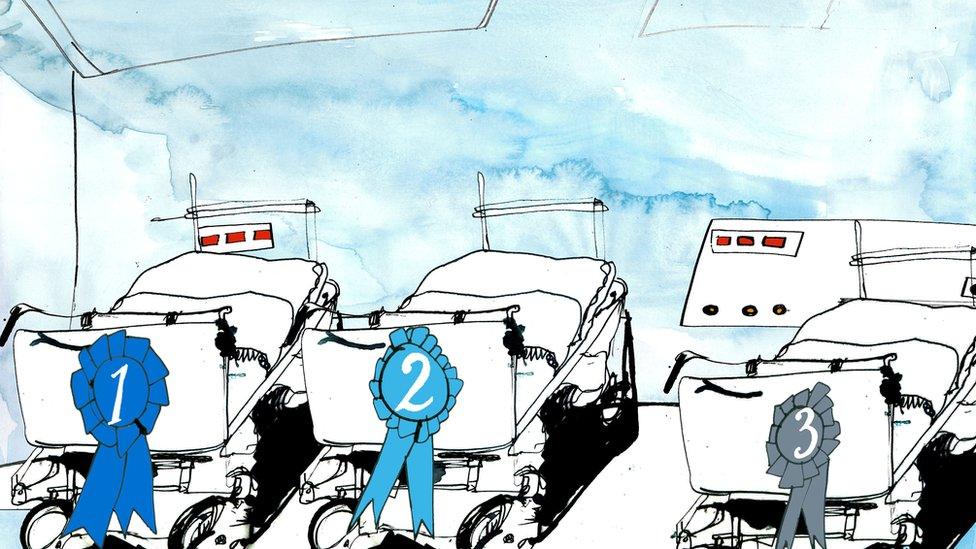Is the NHS a champion or an also-ran?
- Published

How good is the NHS? It's a question much debated over the years, even more so with the 70th birthday celebrations under way.
If there was an Olympics for healthcare, where would the NHS be in the medal table?
There is, of course, no simple answer - but one verdict might be: "We get what we pay for."
An end-of-term report would probably say: "Good in parts but could do better."
Many are the stories of patients who have brilliant care through the NHS and are forever grateful for a life-saving treatment.
There is frequent praise for the compassionate care provided by staff. There is no shortage, though, of tales of long waits in crowded accident and emergency units and for routine operations.
Travelling around the country reveals a service under great pressure with staff working flat out.
Patients' frustration often turns towards "the system" and what they perceive to be lack of money invested by the government.
What will the NHS look like at 100?
The history of the NHS in charts
Nick Robinson: 'Let's be honest about the NHS'
There is a suspicion the NHS wastes money and is an inefficient bureaucracy.
This will be heightened by the recent revelation the service spends £100m a year on postage for letters informing people about appointments.
Some parts of the service are not good at co-ordinating appointments, resulting in multiple journeys for patients.
Some are better than others at monitoring the condition of patients at home.
A safety-first culture might be encouraging doctors to refer patients for scans and checks that are not necessary.
Blunt message
So, cutting through the claims and assertions, how can the NHS be rigorously benchmarked against other health systems?
A comparison with other countries is not straightforward, as data is often gathered in different ways.
But the report for the 91╚╚▒Č by health experts at leading think tanks is one of the most comprehensive and authoritative of its kind.
The blunt message is that the NHS is relatively poor on outcomes for patients diagnosed with some common cancers and after heart attacks.
But, perhaps surprisingly given the intense pressure on the front line over the recent winter, the NHS is in the middle of the pack on waiting times for A&E and routine surgery.
On health outcomes, the scorecard is not overly impressive. Performance is middling to poor.
But when you look at the resources the NHS has at its disposal, things begin to appear in a different light.
Physiotherapists are in relatively short supply
The NHS has fewer than average doctors, nurses, dentists and physiotherapists per 1,000 patients.
As a share of national income, health spending is below average. And when it comes to spending per head of population (adjusted for currencies and inflation), the UK is further behind much of the pack.
The NHS is relatively efficient. Administration costs are not as high as in some other systems, on a par with Ireland and Portugal and well below France and the USA.
So, given the staff and kit available to treat patients, the NHS is doing tolerably well with the money it has. Higher investment might, arguably, improve outcomes.
The government has recently committed an extra £20bn a year for the NHS in England by 2023, which will trigger £4bn more for Scotland, Wales and Northern Ireland.
But there is a growing sense that that will be enough only to cope with rising demand linked to a growing and ageing population.
A financial boost needed to cut waiting lists and allow a big shift in the quality of care has yet to materialise.
Access to healthcare is an important test of a developed economy.
According to the report, the NHS is especially good at looking after people in financial hardship.
It has remained true to its founding principle of being free at the point of delivery.
In conclusion, you could say British people pay for a three-star service and get one.
Getting a five-star service will need more money.
But to have healthcare available to everyone regardless of means is a big asset for the UK and one to be celebrated on the 70th anniversary.
It's not a gold medal winner - but it certainly should be on the podium.